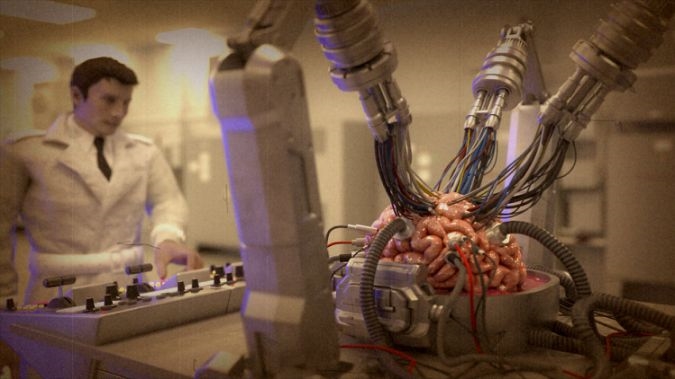‘A Glitch in the Matrix’ and the obsession of simulation theory
‘A Glitch in the Matrix’ and the obsession of simulation theory
It shows us how average people can be swayed, but doesn’t delve deep enough.


If you’ve heard of simulation theory — the idea that our entire universe could be running inside of some sort of extra-dimensional computer — there’s a good chance you encountered it from a high profile believer like Elon Musk. But how would an average person, someone whose clout doesn’t depend on provocative dorm room philosophizing, embrace it? How would the idea that the world isn’t “real” define the way they interact with other people? If you’re even somewhat intrigued by exploring the subculture, you’ll appreciate A Glitch in the Matrix, Rodney Ascher’s latest documentary about uniquely obsessive personalities.
And if you’re wondering, no, the film doesn’t unlock any secrets about simulation theory. Even Ascher tells us he has no clue if it’s true or not. Instead his interest is less in the theory itself, but in why people believe it. His award-winning 2012 documentary Room 237 was about the wild fan theories surrounding Stanley Kubrick’s The Shining. His follow-up, The Nightmare, explored sleep paralysis and the way it often constructs terrifying scenarios out of thin air. It’s easy to draw a line from those films to people who distrust the very fabric of reality.
If the title wasn’t enough of a sign, A Glitch in the Matrix feels like an introduction to simulation theory instead of a rigorous discussion. The Matrix, after all, introduced the concept of simulated reality to an entire generation of emo teenagers (myself, included) in 1999. But what it may lack in depth it makes up for in sheer watchability.

It’s simultaneously hilarious, and a bit sad, to hear seemingly serious adults — represented as cartoonish CG avatars — reject the idea of there being 7-billion individual consciousnesses on Earth. Why? Obviously, because there’s no way our universe simulator has enough processing power to handle that. The more logical explanation, of course, is that the machine is just recycling a couple hundred thousand personalities, the way an Assassin’s Creed game creates its large crowds by reusing AI code.
Too often I wished Ascher would just push his subjects a bit more to test the limits of their beliefs. But I suppose that’s like trying to argue the shape of the planet with a Flat Earther. One subject managed to leave the site of a drunken car crash in Mexico without a serious injury, or being arrested. He thought it was the simulation just working out a successful narrative for him, rather than dumb luck and his American privilege in action. After surviving something like that, how can we convince him otherwise? One person’s miracle is another’s optimal simulation path.
If such stories cause you to roll your eyes, A Glitch in the Matrix has more meaty material from Nick Bostrom, the Oxford philosophy professor whose 2003 paper kicked off modern interest in simulation theory. He proposed that, given the vast amounts of computing power we expect to have in the future, it’s possible that later humans could run simulations of people similar to their ancestors. Those artificial people would likely be conscious. And given that possibility, there’s a high probability that we’re one of those simulated realities, instead of being the “prime” beings. (Alternatively, he argues, we could either go extinct before being able to develop our own simulation tech, or we could abandon the technology completely.)
Bostrom, doesn’t have many answers in the documentary, but he reminds us of the fact that humans have been thinking about higher levels of reality for thousands of years. Plato’s Allegory of the Cave was an argument in favor of education and inquiry in the face of ignorance, but today it also describes the way many people think of simulation theory.
A Glitch in the Matrix also genuinely surprised me with footage of Philip K. Dick explaining his own beliefs about higher consciousness. He famously started experiencing religious visions following an operation, which he ended up writing about in his Exegesis, a collection of more than 8,000 pages of notes. Dick sounds like someone who caught a glimpse at the world outside our potential simulation, though the simplest explanation is that he was suffering from severe mental illness throughout his life.
While I may have some qualms about what A Glitch in the Matrix focuses on, it’s still a well-made documentary stuffed with intriguing visuals. Ascher has perfected his ability to visually convey a narrative over his last few films, so you’ll never be bored. And for people who’ve yet to hear about simulation theory, I’d wager it would blow their minds just like the people who dare to emerge from Plato’s cave.
(24)


